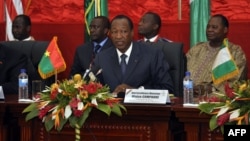West African heads of state met Saturday in Ouagadougou with representatives of Malian political parties and other civil society groups to talk about the way forward in Mali. However, many Malians are skeptical about what will come out of yet another meeting held outside Mali to decide the country’s future.
The Economic Community of West African States (ECOWAS) says it wants to create a more “broad-based” transitional government in Mali, although it is not clear whether this means current office holders will be replaced.
Interim Prime Minister Cheikh Modibo Diarra did not attend Saturday’s meeting, and Interim President Dioncounda Traoré also was not present. He is in France, still recuperating from a beating he suffered in May in an attack by supporters of the Malian soldiers who seized power in a coup more than three months ago.
Many Malians say now is not the time to disrupt the transitional government, which faces the double challenge of organizing presidential elections and regaining control of northern Mali, taken over by Tuareg rebels and Islamic militants shortly after the coup.
Questioning intent
Adama Diakité is president of the Forum of Civil Society Organizations of Mali, one of several groups that were not invited to Saturday's summit.
“There are two main civil society coalitions in Mali, and neither was invited to Ouagadougou,” he said. “This raises doubts of whether the West African leaders really want to hear from everybody.”
Diakité said it is unfortunate that his civil society forum learned only through media reports about the meeting to decide Mali's future. “These civil society coalitions are in close contact with the population and have a unique and important perspective on Mali’s situation,” he added.
Members of 16 political parties and civil society groups, including religious organizations, gathered Friday in Bamako to voice their discontent about the ECOWAS meeting in Ouagadougou, which one called “another humiliation for the Malian people.”
One resident of the capital told VOA that he and many others opposed the Ouagadougou summit because it excluded so many Malians. He said he and many other Malians see it as only the latest in a series of ECOWAS meetings that have failed to solve the political crisis.
Criticism rejected
ECOWAS communications director Sunny Ugoh told VOA the regional group regards the organizations it invited to join the talks in Ouagadougou as sufficiently representative of Malian society.
“If certain groups were not invited, that does not mean they are unimportant,” Ugoh said, adding that there likely will be future opportunities for these groups to participate in a national dialogue.
“Even if they are not invited ultimately," he said, "this is their country - it doesn’t stop them from making contributions in other ways to the stability and peace of their country.”
Diakité of the civil society forum said he does not discount the importance of the discussions in Ouagadougou. “All discussions about Mali’s crisis are useful,” he told VOA. “But it’s what will take place in Mali that will be most important. Whatever the outcome of the Ouagadougou summit, it should be simply a basis for further dialogue - back in Mali.”
The Economic Community of West African States (ECOWAS) says it wants to create a more “broad-based” transitional government in Mali, although it is not clear whether this means current office holders will be replaced.
Interim Prime Minister Cheikh Modibo Diarra did not attend Saturday’s meeting, and Interim President Dioncounda Traoré also was not present. He is in France, still recuperating from a beating he suffered in May in an attack by supporters of the Malian soldiers who seized power in a coup more than three months ago.
Many Malians say now is not the time to disrupt the transitional government, which faces the double challenge of organizing presidential elections and regaining control of northern Mali, taken over by Tuareg rebels and Islamic militants shortly after the coup.
Questioning intent
Adama Diakité is president of the Forum of Civil Society Organizations of Mali, one of several groups that were not invited to Saturday's summit.
“There are two main civil society coalitions in Mali, and neither was invited to Ouagadougou,” he said. “This raises doubts of whether the West African leaders really want to hear from everybody.”
Diakité said it is unfortunate that his civil society forum learned only through media reports about the meeting to decide Mali's future. “These civil society coalitions are in close contact with the population and have a unique and important perspective on Mali’s situation,” he added.
Members of 16 political parties and civil society groups, including religious organizations, gathered Friday in Bamako to voice their discontent about the ECOWAS meeting in Ouagadougou, which one called “another humiliation for the Malian people.”
One resident of the capital told VOA that he and many others opposed the Ouagadougou summit because it excluded so many Malians. He said he and many other Malians see it as only the latest in a series of ECOWAS meetings that have failed to solve the political crisis.
Criticism rejected
ECOWAS communications director Sunny Ugoh told VOA the regional group regards the organizations it invited to join the talks in Ouagadougou as sufficiently representative of Malian society.
“If certain groups were not invited, that does not mean they are unimportant,” Ugoh said, adding that there likely will be future opportunities for these groups to participate in a national dialogue.
“Even if they are not invited ultimately," he said, "this is their country - it doesn’t stop them from making contributions in other ways to the stability and peace of their country.”
Diakité of the civil society forum said he does not discount the importance of the discussions in Ouagadougou. “All discussions about Mali’s crisis are useful,” he told VOA. “But it’s what will take place in Mali that will be most important. Whatever the outcome of the Ouagadougou summit, it should be simply a basis for further dialogue - back in Mali.”




